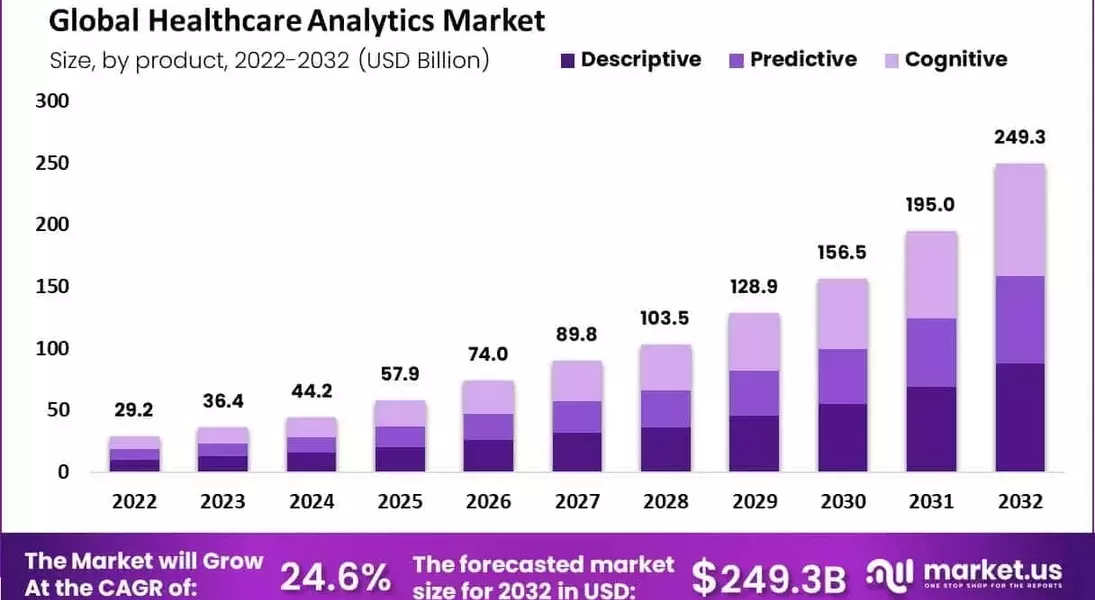



The global healthcare analytics market, currently valued at USD 36.4 billion in 2023, is projected to soar to approximately USD 249.3 billion by 2032, registering an impressive compound annual growth rate (CAGR) of 24.6%. This rapid expansion underscores the increasing reliance on advanced data analytics to optimize healthcare services, reduce costs, and improve patient outcomes. The North American region leads this trend, capturing over 40% of the market share and generating significant revenue. By integrating real-time and historical data, healthcare providers can predict trends, enhance clinical care, and drive patient engagement, ultimately delivering better services and fostering long-term growth.
Market Expansion and Key Drivers
In the vibrant autumn of innovation, the healthcare analytics sector is witnessing a transformative shift. The surge in market value is fueled by several key factors, including government initiatives and the widespread adoption of big data analytics. Electronic health records (EHRs) play a pivotal role in this transformation, creating vast datasets that empower physicians and administrators alike. Technological advancements and growing investor interest in analytical tools are further accelerating market expansion. The transition from paper-based systems to digital platforms has revolutionized healthcare delivery, enhancing operational efficiency and broadening service offerings.
The U.S., with its high per capita healthcare spending, stands out as a major contributor to this growth. In 2021, the country spent $12,914 per person on healthcare, significantly higher than the average of other wealthy nations. The adoption of electronic case reporting (eCR) has also surged, with 380 critical access hospitals implementing it by early 2024, up from 300 in early 2023. Additionally, telehealth adoption in rural areas has significantly improved healthcare accessibility, while nearly 90% of hospitals have adopted updated standards under the Cures Rule, advancing interoperability through new certification criteria.
Emerging Trends and Company Innovations
Several emerging trends are reshaping the healthcare landscape. Artificial intelligence (AI) is enhancing diagnostic accuracy, particularly in interpreting chest X-rays, while wearable devices provide detailed health data and actionable insights. The number of U.S. hospitals with centralized 3D printing facilities has grown from just three in 2010 to over 110 in 2019. AI is also improving administrative tasks such as scheduling, billing, and record management, streamlining operations and reducing costs.
Leading companies like McKesson Corporation, IQVIA, IBM, Optum, Cerner Corporation, Oracle, and Elsevier are driving advancements in healthcare analytics. McKesson's acquisition of Compile strengthens its data integration capabilities, while IQVIA's Human Data Science Cloud offers scalable data management solutions. IBM's Watson Health division continues to invest in AI and machine learning, and Optum emphasizes personalized care through AI-driven analytics. Cerner focuses on predictive analytics for health outcomes, and Oracle introduces new features for secure, compliant healthcare data management. Elsevier innovates with evidence-based decision support tools, ensuring real-time data analysis for improved clinical decisions.
Impact and Future Prospects
From a journalist's perspective, the rapid growth of the healthcare analytics market signifies a promising future for the industry. By leveraging advanced technologies, healthcare providers can deliver more personalized and preventive care, ultimately improving patient outcomes. The integration of AI, telehealth, and wearable technologies not only enhances diagnostic accuracy and operational efficiency but also enables proactive and targeted interventions. As stakeholders continue to adopt data-driven strategies, healthcare analytics will play an essential role in addressing challenges and driving long-term growth and transformation across the industry. The projected market expansion highlights the increasing importance of analytics in optimizing healthcare services and achieving cost-effectiveness, setting the stage for a healthier and more efficient future.
